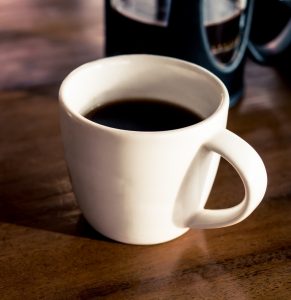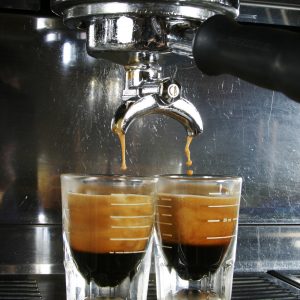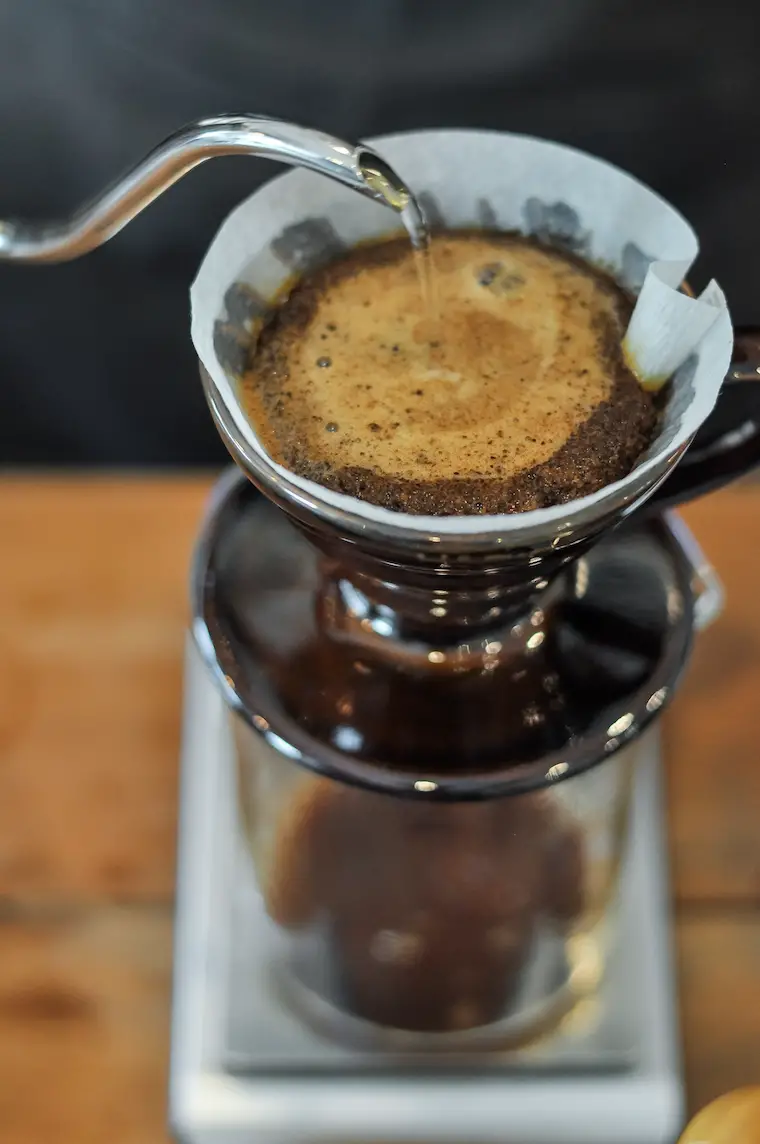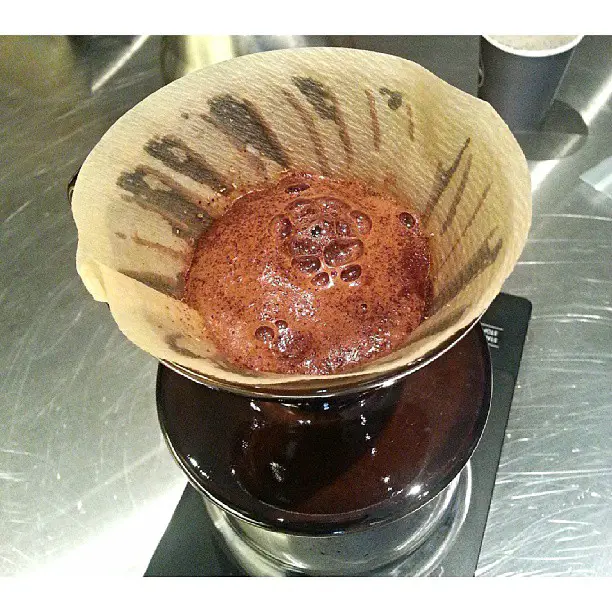Have you noticed a roast date on a bag of coffee? Firstly, it’s a sign you’ve bought the good stuff. Proud of you, dude. (Coffee beans without a roast date are uh — for the most part — not fit to serve your local sewer rats).
Thing is… There’s no expiry date either. No “best by” date. Coffee doesn’t go off like food does. It doesn’t work like that.
So read on to find out my invaluable rule of thumb that can answer the question, “How long do coffee beans stay fresh?” I got this rule from an old coffee hand who could spot a bag of stale beans at 30 paces.
You’ll also discover my top 5 tips to avoid stale, lifeless coffee by making every coffee bean you buy stay as fresh as the day you bought it.
How long do coffee beans stay fresh?
Coffee beans are at their best for about 15 days after they have been roasted, and are still pretty flavorful for 30 days post-roast. After this period, they lose a lot of flavor and are considered ‘stale’ (although they will take years to become ‘bad’ and undrinkable). One important thing to realise though…
When us high-faluting, coffee hipster-types talk about how long coffee lasts, we’re talking about its peak flavour. The kind where you bring a cup to your mouth and your nostrils are just overwhelmed by a strong scent of jasmine. Where a splash of the brown stuff hits your tongue and it’s like a blueberry just burst in your mouth.
Coffee beans do lose those bold flavors quickly. So I’d aim to buy any coffee with the intent of finishing it inside a couple of weeks.
How long until coffee is no longer drinkable?
Coffee beans will last for years and not spoil. It’s not like meat or cheese or bread, where a billion tiny lifeforms are ready to enjoy a banquet the second you take it out the fridge.
There are two reasons for this. The first is that coffee lacks calories. There is just little no energy for bacteria and other nasties to feast on. The second is that caffeine is a natural toxin — the Coffea plant’s defense against insects actually — and prevents undesirable things growing on it.
So let’s say you can deal with coffee not tasting its best. In that case, your coffee beans will last a long time. Months or years can pass and you’ll still be able to make a safe brew.
Do coffee beans last longer in the freezer?
Coffee beans do last longer in the freezer, and they can be stored long-term in the freezer while keeping maximum freshness. Scott Rao explains this in detail in his superb book Everything But Espresso. He describes how:
A freezer is a fantastic long-term storage method because it dramatically slows oxidation and loss of volatiles.
Scott Rao, Everything but Espresso
In simple terms, the coffee beans don’t interact with oxygen much. So they lose less of the uh good “flavory” stuff. Basically, less oxygen equals more freshness.
Check out these purpose-made airtight coffee storage containers you can use for this. He also says you can use a plastic bag. Just try to squeeze as much air out as possible.
One last tip from the Rao-ster: Don’t defrost and freeze them again. You should only do it once.
How long does green/unroasted coffee last for?
The general rule favored by coffee roasters is green coffee is good for 6 to 12 months. Any more than this and you lose flavor, although it’s not quite as drastic as letting roasted coffee go stale. The reason green coffee last a lot longer is because the roasting process — heating, basically — is what brings out the flavor.
It’s important to remember this timeframe as when you buy green coffee you tend to get a bulk discount. Order an amount you think you can roast (and drink!) within a year and you’re golden.
Do whole coffee beans last longer than ground coffee?
Whole coffee beans last a lot longer than ground coffee. The reason is that the main process where coffee loses its flavor is through oxidation. This is where oxgyen in air reacts with the coffee and causes it to lose flavor. When you grind your coffee? All those tiny grounds have way, way more surface air and that means way more oxidation with the oxygen that surrounds it.
For the best taste, you want to drink your coffee within minutes of grinding it. If you ever see an option to have your coffee beans “preground” then keep in mind that’s a convenience thing. Not a taste thing.
How long do espresso coffee beans stay fresh?
Coffee beans for espresso stay fresh for around 30 days after the roast with the best flavor coming inside the first 14 days. You can make espresso using coffee beans after that but, like with brewed coffee, the taste will be lacking “punch”.
One key difference with espresso is that the beans need to degas longer. This is because the buildup of carbon dioxide in the roasting process can have a more adverse effect when brewing with an espresso machine. A rule of thumb with espresso is to wait five days after the roast before using it.
Coffee beans made for Brewed Coffee
The best taste will come between 2-10 days after the beans have been roasted. Coffee will stay fresh and keep much of their flavor until about 30 days after the roast. Past that and the beans would be considered stale in most cases.

Coffee beans made for Espresso
Espresso requires a little longer for degassing so the best taste should come around 5-14 days after the roast and you’ll be able to pull decent espresso 5-30 days after roasting.

Can you drink coffee too soon after the roast?
It is possible to brew your coffee too early after the roast. The roasting process heats the coffee beans up to a very high temperature. For a dark roast, we’re talking in the region of 400°F. Hot stuff.
What this does is essentially cook the coffee beans which creates a lot of carbon dioxide. Straight after roasting, a lot of this CO2 is still in the coffee. Brew it and you’ll get an acrid, undesirable taste.
So roasters give a small amount of time — called resting — before selling it. The CO2 escapes quickly, about 40% of the CO2 will have left just in the first day after the roast. And it’s good to drink some time up to 3 days for brewed coffee and maybe 3-5 days for espresso.
You can check the roast date on any coffee beans you buy to see if it’s too early to brew. That said, most roasters won’t sell you the beans until they’re ready.
One last tip: You can remove excess CO2 by doing something called a bloom. Splash a touch of hot water in your grounds. Not too much. Not enough to brew the whole thing, or even cover it. What will happen is the coffee will start to bubble and fizz. This is the CO2 escaping.
The earlier you brew your coffee after the roast the larger a bloom you are likely to see. Make a brew the day after the roast and you’ll see your Pour Over explode with fizzy bubbles of coffee! And in fact, this is the best way of knowing for certain that your coffee is fresh.
Here’s what a bloom looks like:

Tips for making your coffee last longer
If you want delicious and fresh coffee every time you brew, then follow these tips. They’ll have your coffee in prime condition every morning.
- Keep your coffee beans dry.
- Put your coffee in a place that is cool. Room temperature is fine, no need to put them in a fridge.
- Use a vacuum packed container. Roasters usually sell bags that have a vacuum lock. But failing that, a mason jar or a purpose built container works too.
- Keep your coffee beans away from sunlight.
- Grind your beans fresh each time you brew.
Conclusion
By now, I hope it’s drilled into you. Brew your coffee in less than 30 days for good quality coffee. And less then 15 days for the best of the flavor.
This is all assuming you are buying freshly roasted coffee every time. Great roasters are everywhere, these days. I can even help you to find your local independent coffee roaster.
Nothing in your area? There’s lots of excellent options online too. They’ll roast your coffee up and pop it in the post same day. A nice smelling package will land on your doorstep soon after.
Whatever you do, make sure you’re buying coffee with a roast date on it. It might be the tip I tell people in real life the most. Such an easy win to level up your coffee game.
Got a taste for learning about coffee now? Here’s some other stuff I wrote about buying coffee beans. Learn the difference between roasts and how lighter or darker roasts changes the taste,
how the different regions and countries differ in terms of tastes and what the phrase ‘Single Origin’ means and why it makes a big difference to your coffee.


8 Comments
Hi Pat,
Thanks for the nice article. I read it in my workshop while I was roasting a nice Honduras coffee. My son turned me onto the hobby about a year ago and I’ve probably put 50 pounds of coffee through my little Behmor roaster. Think you should do an article in roasting your own. It’s fun, inexpensive, and pretty much ensures a good cup of coffee every time.
Regards,
Dutch Redman
Vermont
Hi Pat,
I would like to thank you for your writing about coffee .
This is give me more knowledge about coffee.
Specially about how long , and how to brew from coffee bean.
I have heard from people that coffee can be store for long time the longer we stored the better taste you get. ( but i don’t agree with that cos i have tried to use the old coffee bean the creamer didn’t came up) so i believe that 7 to 14 days after roasted is the best result).
Do you have a knowledge about roasting coofee? Thank you hope you can share your knowlege about it
Hey Ronnie, great to hear from you.
I have never heard anyone whose opinion I respected say that the taste of coffee beans improved for the longer you store it. Perhaps they were talking about green (unroasted) beans?
And I’ve dabbled in roasting but I’m no expert. Definitely something I’m looking to get more into though!
What does this sentence you wrote mean?
“Not brewing with fresh coffee that’s just been roasted is the number one way to level up your coffee drinking for 90% of people, I’d say.”
I have a BA in linguistics and I’m a native English speaker. What in the world does that sentence mean?
Seems the sentence makes much more sense if you exclude the ‘not’ at the start. I’ll edit it.
Hi Pat,
Thanks for the great article it was very informative. I found the bit about freezing coffee very interesting as most of the other articles I have read advise against it. But it makes sense if you are wanting a long term storage solution.
James
Excellent article! There’s no photo just above of the brew you made, though.
Pat, I could agree more with your assessment and article. When asking coffee lovers, your “30 days” seems to be the universally quoted number. And your point about “taste” is spot on. What’s the difference between day 1 and day 30, well as you said, taste. If you like industrial burnt and bitter coffee, then you’d be happy drinking coffee that was roasted a year ago.
I do have a “fresh” coffee preservation suggestion that’s worked for me. I toss in a 300cc Oxygen Absorber into my air tight container of coffee. This isn’t the perfect solution, but it’ll make 30 day old coffee taste like 15 day old coffee. You can get the oxygen absorbers on Amazon for dirt cheap. All-in-all, they’ll make even 60 day old coffee taste 90% as good as 1 day old coffee.
It’s certainly not a perfect solution, but it’s a long way better than any other method that I’ve tried.
Good luck and thanks for the good article